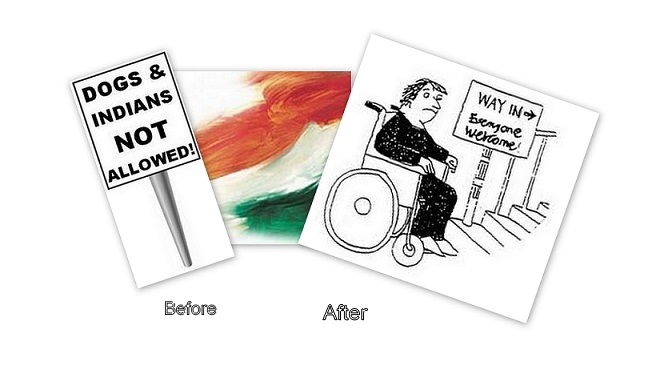Barriers barriers all the way!
Stairs without lifts, books without Braille prints, communication devoid of sign language...there still pervades a reign of inaccessibility. More than 50 million disabled people in our country till this date, live like slaves.. People with impairments still remain oppressed...Oppressed by negative social attitudes, oppressed by insensitivities, and oppressed by apathy and what not. Where is the freedom in actual sense of the term!
There hasn’t been much change between pre-independence period and this postmodern world of 21st century.
Some very pertinent questions thus need to be answered...Do people with disabilities enjoy the same freedom as those who are considered “normal”? Can people with disabilities make their own choices in spite of having the same desires, needs and aspirations as the non disabled? Does the society take an account of all this and is it ready to make satisfactory reasonable adjustments for them?
Yesterday I just went for a drive around in our capital city i.e. Delhi. And one instance sent shivers in my spine. A blind was man trying to cross the road. It is not that he wasn’t helped by anyone, as we still have some sensitivity left in us. The person who came forward to help him did so by clutching his shirt collar and his shirt’s sleeves. My heart really bled at whole scene. Are people with disabilities so inferior and insignificant? We are treated as objects and nothing more. .. Disability is only seen as something that can only invoke pity or in need of a cure. Nobody looks at it as a positive asset.
Physical and psychological anomalies may affect as persons functioning. But impairments are turned into handicaps due to barriers of all kinds. Environment and organizational hurdles prevent a disabled person from getting equal opportunities in education, employment, housing, transport, leisure and may other things. Lack of education and employment create a vicious circle where people with disabilities have to live in abject poverty particularly in rural areas and in small towns. Although being capable of productive work, they are regarded as incapable.
They are unable to learn any skills which could make them financially independent apart from contributing in the national income of the country. The economy loses a great amount of productive capacity along with creating large number of dependents in an economy which already has meagre resources to sustain them. There is lack of access. Social, psychological and structural barriers completely make them immobile.
Social barriers include cost, lack of awareness among the general public and communication. The non disabled don’t realize the fact that most people experience disability at some point in their lives through illness, accident or aging. Help to the disabled is offered by the people in either patronizing or in demeaning ways. Have you have seen bus drivers allowing sufficient time to a disabled person to alight the bus?
Structural barriers include unfriendly vehicle design, pedestrian environment, infrastructure etc. If a disabled person wants to use the sidewalk, he might fall because of poor and unpaved ways or they always remain crowded by the vendors. The road surfaces in our country are so rugged that the wheel chair user might break the wheels of his chair!
Psychological barriers include low self esteem and fear of personal security while moving out of home alone without any escort.
Majority of people with disabilities have not tasted the delicious flavour of freedom, as the world is beyond their reach. Even the basic desires to go to school, temples, going out with friends, watching a movie in the theatre, getting married etc remain out of their periphery. They have to remain behind four walls. The perpetual denial of their basic rights and ostracism sometimes starts from family itself. Even the family functions and ceremonies are arranged at inaccessible places, where the person with disability is ‘’carried like baggage or a bundle’’ absolutely negating his existence as a human being. These attitudinal barriers make the societal relationships unequal.
Apart from all these the high cost of treatment and expensive assistive devices and mobility aids cause another kind of obstructions in their lives. Correctional surgeries are alarmingly expensive and in the wake of some weird insurance policies people with disabilities are not even given appropriate facility of health insurance.
Unfortunately within the developing world, the provision of facilities for disabled people is mainly seen as a welfare function of the state and there is always a crunch of resources with the state. And, ironically in this politics of vote bank, even polling booths are inaccessible. The need rests on to find cost effective means and little bit innovation to make the lives the ‘’differently abled’,’ somewhat comfortable along with enabling them to take part in the process of productive activities in the country. A good urban project does not cost more if it is willing to include universal design concepts. The state needs to prioritize about whom it needs to accommodate. Society needs training at every step to include people with disabilities into the mainstream. It needs to change its notions and adapt a more broadened outlook.
I was pondering upon the slogan given by Subhah Chandra Bose, a great freedom fighter, “Give me blood and I will give you freedom”. And now after 64 years of getting that blessing of freedom from those 100 years of colonial rule, I think this slogan needs to be reframed, especially by the people with various forms of impairment. Now it should go like this, “Give me accessibility and I will give you productivity”.
Let this section of the society now remain visible in the agendas and policies of the policy makers. Let them have a walk towards freedom at least after 64 years of independence.

